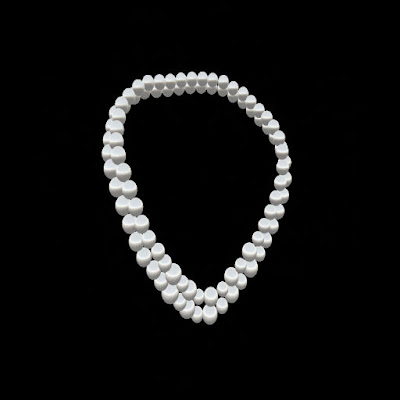 Maupassant was a meticulous writer who wrote mostly about the common everyday experiences of people. His talent was in creating a “real” world on the page and addressing problems which arose in the common course of daily life. His stories often compared social classes, a common theme for writers of his time. They juxtaposed the lives of bureaucrats with those of the peasant classes to show the complexity of social life in Paris in the mid to late nineteenth century.
Maupassant was a meticulous writer who wrote mostly about the common everyday experiences of people. His talent was in creating a “real” world on the page and addressing problems which arose in the common course of daily life. His stories often compared social classes, a common theme for writers of his time. They juxtaposed the lives of bureaucrats with those of the peasant classes to show the complexity of social life in Paris in the mid to late nineteenth century.Because he focused on social juxtaposition of the classes, most of Maupassant’s short stories are laden with ironies. These ironies are often the direct result of a fatal flaw, as in “The Necklace” we see Mrs. Loisel affected by her desire to appear more respectable which is a direct result of her vanity. This short story is littered with judgments about women: their role in society and the expectations placed upon them both socially, morally, and personally. Find some examples in the text where Maupassant is passing judgment on women. Look for examples from all the female characters. Then choose one you feel strongly about and comment on how that judgment functions in the text. Is it an example of a common everyday experience? Is it a common social convention of the time? Does it reinforce the irony? Would Maupassant’s view be accepted in today’s world?

12 comments:
"for women have no caste or class, their beauty, grace and charm serving them from birth or family, their natural delicacy, their instinctive elegance, their nimbleness of wit, are their only mark of rank, an put the slum girl on a level with the highest lady in the land."
in this passage Maupassant says that women do not belong to a social class and their outward appearence is what defines women is societies eyes. Maupassant is saying that without beauty a woman is nothing.
"She had a rich friend, an old school friend whom she refused to visit, because she suffered so keenly when she returned hom. She would weep whole days, with grief, regret, despair, and misery." This example proves Madame Loisel's pride and selfishness. Throughout the story she seems to think of nothing but herself and what other people think until she loses the borrowed necklace. She is then forced to lower her status even more by working ten years to pay off the new necklace.
She compares herself to higher class women and strives to be like them and feels sorry for herself because she is not. Instead of being humble and thankful for what she does have, she dwells on what she does not. Maupassant gives a materialistic view in her eyes. Her life goals revolve around material things and social staus.
As Madame begins to leave the party she has to put on her old cheap overcoat. “she was conscious of this and was anxious to hurry away, so that she should not be noticed by the other women putting on their costly furs."
In this excerpt from the story Maupassant emphasizes the Madame’s embarrassment and shame. Her anxiousness and hurried demeanor prove that she indeed was ashamed of who she was. I believe that Maupassant is trying to show the weakness in women, and how they, in trying to impress others, forget to impress themselves. The Madame even let this embarrassed feeling go deeper and was even embarrassed by her husband whom supported her. i mean come on he bought her a dress with the money he was saving for a gun. For her to not show gratitude shows that she neglects the feelings of others because she is too busy trying to find a way to impress them. Maupassant makes a point to say that although she is trying to impress people in general, she is mostly only trying to impress other women. Doesn’t that still happen today???? Women still compare, critique, and pick each other apart. it is a cycle that is never ending and thus deteriorating. Should we blame the guys for making women feel they need to compete or is this problem within the women???
KittyKat wrote "Should we blame the guys for making women feel they need to compete or is this problem within the women???"
Men truely place too much on women and foster this "competitive spirit" which is by most accounts unhealthy. However, even if it's not the men's fault wouldn't women blame them anyway?
"She suffered endlessly, feeling herslef born for every delicacy and luxury. she suffered from the poorness of her house, from its mean walls, worn charis, and ugly curtains. All these things, of which other women of her class would not even have been aware, tormented adn insulted her."
This is showing that this women isn't satisfied with the life she has or anything in it. She should be greatful for what she has...and what makes her mad is that no one seems to see what she has to go through cause they are all to busy trying to make themselves look of higher statues.
This is the common mistake that we make in life. The fact that we are to consumed with what people think of us and what image we are giving off rather then just enjoying what we have been givein and the opportunity to just enjoy each others company.
Yes this is a reinforcement of irony....Irony that people seek to be happy but rely to much on materialistic happiness then real happiness.
"She flung herself on her friend's breast, embraced her frenziedly, and went away with her treasure...She was the prettiest woman present, elegant, graceful, smiling, and quite above herself with happiness." This shows that Maupassant was saying that women need to be noticed at parties or they won't go. As her husband gave her so much money to find a dress, so she would not look poor, and she borrowed, what she thought was, such an expensive necklace. Maupassant is judgemental in saying that women are truly all about class and looks. I do believe that we can see this in every day life. Women like to look good and be noticed, so this is somewhat a true view of women today.
My favorite line is actually a quote from Madame forestier " Oh, My poor Mathilde! But mine was imitation. This is in itself a judgement on women. The author is showing through irony how women go through great lengths to look their best but in the end it is all for nothing. When Mathilde borrows the "fake" neckalce to make herself look better she is really doing nothing. Since the neckalce is fake it seems as though it is less beautiful and if she would have known that maybe she wouldn't have taken it knowing that it was worth less. The judgement is that women want something to make them seem higher up more or less better. They want to have something nicer than anyone else to make them seem at a higher social standing. Women are vain.
"She had no clothes, no jewels nothing. And these were the only things she loved; she felt that she was made for them."
This is an example of how materialistic and stuck up Maupassant is protraying women. This quote does reinforce the irony of The Necklace because without all the materialistic values and trying so hard to be better than she was nothing bad would have happend. I believe that Maupassant's view would be accepted by a few people but i think that more people would be outraged. More woman stand up for themself now then when this passage was written in 1884 by a long shot.
The quote that I felt most powerful was a line taken when Madame Loisel and her husband arrived at the party. "She was the prettiest woman present, elegant, graceful, smiling, and quite above herself with happiness." Maupassant is attempting to say that women are always trying to be better than one another. Maupassant's belief is also seen in today's world. Women are still working hard to be better than someone else. Jealousy takes over and some women will do almost anything to be a member of a higher social status.
The quote "No; there's nothing more humiliating than to look poor among other women who are rich." reflects mostly on the class aspect of this story. It displays how caught up in status appearance Mathilde is, its as though she is comparing herself with everyone else at this party and some how feels in a higher social status just becuase of the clothes and jewels she is wearing. Basically shows how women compare themselves to one another and are constantly trying to look better.
"She had no clothes, no jewels, nothing. And these were the only things she loved; she felt that she was made for them. She had longed so eagerly to charm, to be desired, to be wildly attractive and sought after." This is a common experience, with some social involvement. This generalizd view would probably be accepted by many in this world for it is true of many women but it is a general judgement that all women want its pretty clothes and jewels to make them "wildly attractive" so they can show off for their friends at a party.
Maupassant says that women do not belong ina social class. According to him women are only beauty and if they dont have beauty then they are nothing worthy. He said this in the first paragraph of the story. I think that Maupassant is a sexist prick just like Hardy. They both find women to have nothing other than there apperance and men are so much more superior than women but in this story Lady Loisel is the superior one. When she wanted something she made her husband get her it becuase she was the one who was more superior than he in the relationship. She made the decisions not him.
I thik Lady Loisel was to materialitstic and that was her fatal flaw that is what ruined her. She lost her beauty and the little bit of belongings she had because she was to caught up in looking more acceptable than what she was.
Post a Comment